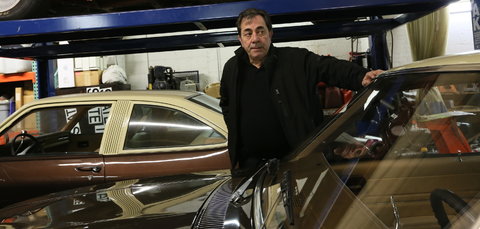 Ozier Muhammad/The New York Times Ralph Lucci: “It took five hours to destroy the business.”
Ozier Muhammad/The New York Times Ralph Lucci: “It took five hours to destroy the business.”
Case Study
What would you do with this business?
Last week, we published a case study about Ralph Lucci, owner of Automobile Film Club of America, a company that has supplied vehicles for film and television productions since 1993. Based in Stapleton, on Staten Island near the waterfront, the company’s lot and 57 cars were flooded last October during Hurricane Sandy’s surge.
Initially, Mr. Lucci estimated that it could cost $400,000 to replace the cars and refurbish his office, the shop and the equipment. He now thinks it could cost as much as $575,000. But with the cars covered just for liability, Mr. Lucci said that insurance would not provide enough money.
As a result, he has wrestled with closing the business for good or borrowing a lot of money and trying to rebuild. He was approved for a $25,000 New York City emergency loan for small businesses, an amount that is less than the cost of repairs on his office. He has debated whether he should apply for a Small Business Administration loan, but it would come with two stipulations that he found difficult. One would be that he obtain flood insurance, which Mr. Lucci estimated could cost up to $25,000 a year. The second stipulation would require that he post his house as collateral, something that seemed especially risky to a 60-year-old man.
In a recent interview, condensed and edited below, Mr. Lucci explained his decision on the S.B.A. loan and responded to some reader comments.
Did you decide whether to take the S.B.A. loan?
It was too expensive. The S.B.A. wanted me to get a $1 million flood insurance policy. That’s $2,100 a month. I could get an equity loan on the building for a lot cheaper and I wouldn’t have to get flood insurance. I could also put an equity line on my house, which is not in the flood zone.
What will you do instead?
I took the $25,000 city loan. And I applied for a $10,000 grant from the city and some others. I’m not going to get all the money that I lost, but I’m making it up. Whatever I don’t make up, I’ll get through grants or some small loans.
So are you scaling back the business?
Actually it grew. I used the $25,000 city loan to buy seven cars. I’m doing a show now and I got called for a TV pilot. The lifts we fixed, the compressor we fixed. I didn’t fix the office. Like somebody said, `don’t do the office.’ Use money to make money. I’m working out of the house. At one TV show they’re crashing a lot of cars. We make money that way.
Some of the readers said you should have learned a lesson from the flooding during Hurricane Irene. What will you do differently?
Next year I’ll make sure I move all my cars out. I’ll do my office differently. I’m raising the heaters, raising the equipment. Everything is going to be off the ground. I’ll evacuate a couple days ahead of time. If I hear there’s a storm, I’ll pick up computers. All the cars are parked five blocks away.
If you stay in the same spot, shouldn’t you get flood insurance anyway?
I’m not sure.
How much can you afford to pay?
Probably $5,000 a year, not $25,000.
A few readers suggested that you become a broker who finds cars for the movie business rather than owning your own. Have you considered that option?
I have a database of 10,000 cars from here to California. I’ve been doing that for years.
Have you thought about selling your property to make some cash? One reader suggested you move to a safer location, perhaps outside the city to lower your costs. Would you do that?
I won’t get the money that the property is worth. There are big plans for this area, including a mall and housing. When the value doubles, then I’ll sell it. I live here, so it’s 10 minutes away from my house. I work to 3 in the morning sometimes.
What will happen to your business in the next year?
I’m planning on rebuilding the fleet. I’m not going to quit. I might do a car museum. I’ll be leasing. I know I’m 60, but I can’t quit. I’ll die. I started this business with zero. I can do it again. Money’s coming in. I’m working hard.
Article source: http://boss.blogs.nytimes.com/2013/02/12/why-a-victim-of-sandy-doesnt-want-an-s-b-a-loan/?partner=rss&emc=rss
Speak Your Mind
You must be logged in to post a comment.